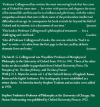Hi All,
We had a fascinating session this past Saturday on Kierkegaard’s most famous work, Fear and Trembling – fascinating thanks to the author, who has once been called the most original thinker that Scandinavia has ever produced. Thanks also to everyone who contributed fabulously to it.
After discussing with those present, I give you the revised list of readings for the remainder of 2019.
Existential Philosophy
Soren Kierkegaard, Fear and Trembling (1843) [Oct 5] - completed
Friedrich Nietzsche, On the Genealogy of Morality (1887) [Oct 19]
Martin Heidegger, Being and Time (1927) [Nov 2 and Nov 16]
Jean Paul Sartre, Being and Nothingness (1943) [Dec 7 and Dec 21]
Note that we have dropped Simone de Beauvoir and Ayn Rand from the list, for now. If there is a demand, we could come back to them in a Literature Series - more on that later. Their best works happen to be literary or fictional works rather than philosophical, non-fictional works). The more immediate reason is that, given our time constraints, we cannot cover all six thinkers as we had originally intended. It is our aim to complete this current Series on Existential Philosophy by the end of the year. We can do all six, in a rushed manner, or focus on four of them. We have decided that the latter approach is the better part of valor - at ISGN, we like to go deep on works of depth. In addition, since our general rule is to do an individual author’s most important work, and since Heidegger’s and Sartre’s most important works are extremely long, we would have to spent more than one session on them. The revised list includes only the most important works of the four thinkers.
Please note also that there are three Saturdays in November. Since we do not meet on the third Saturday of a month, if there is one, we will in effect have a total of five weeks to read Sartre’s Being and Nothingness, which is by far the longest work in this Series.
So, go ahead and order your personal copies of Heidegger’s and Sartre’s tomes.
And, as previously announced, our reading for October 19 is Nietzsche's On the Genealogy of Morality.
We had a fascinating session this past Saturday on Kierkegaard’s most famous work, Fear and Trembling – fascinating thanks to the author, who has once been called the most original thinker that Scandinavia has ever produced. Thanks also to everyone who contributed fabulously to it.
After discussing with those present, I give you the revised list of readings for the remainder of 2019.
Existential Philosophy
Soren Kierkegaard, Fear and Trembling (1843) [Oct 5] - completed
Friedrich Nietzsche, On the Genealogy of Morality (1887) [Oct 19]
Martin Heidegger, Being and Time (1927) [Nov 2 and Nov 16]
Jean Paul Sartre, Being and Nothingness (1943) [Dec 7 and Dec 21]
Note that we have dropped Simone de Beauvoir and Ayn Rand from the list, for now. If there is a demand, we could come back to them in a Literature Series - more on that later. Their best works happen to be literary or fictional works rather than philosophical, non-fictional works). The more immediate reason is that, given our time constraints, we cannot cover all six thinkers as we had originally intended. It is our aim to complete this current Series on Existential Philosophy by the end of the year. We can do all six, in a rushed manner, or focus on four of them. We have decided that the latter approach is the better part of valor - at ISGN, we like to go deep on works of depth. In addition, since our general rule is to do an individual author’s most important work, and since Heidegger’s and Sartre’s most important works are extremely long, we would have to spent more than one session on them. The revised list includes only the most important works of the four thinkers.
Please note also that there are three Saturdays in November. Since we do not meet on the third Saturday of a month, if there is one, we will in effect have a total of five weeks to read Sartre’s Being and Nothingness, which is by far the longest work in this Series.
So, go ahead and order your personal copies of Heidegger’s and Sartre’s tomes.
And, as previously announced, our reading for October 19 is Nietzsche's On the Genealogy of Morality.



